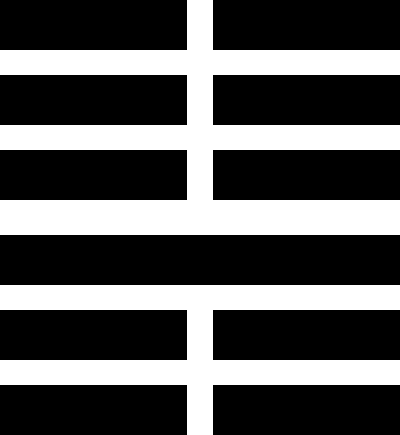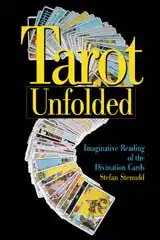
Upper trigram: K'un The Receptive, Earth
Lower trigram: Kên Keeping Still, Mountain
The Judgement
Modesty creates success.
The superior man carries things through.
The Image
Within the earth, a mountain:
The image of Modesty.
Thus the superior man reduces that which is too much,
And augments that which is too little.
He weighs things and makes them equal.
The Lines
These texts apply only for the lines that were marked, when the hexagram was cast. Note that the lines are counted from the bottom up.
The bottom line marked means:
A superior man modest about his modesty
May cross the great water.
Good fortune.
The 2nd line marked means:
Modesty that comes to expression.
Perseverance brings good fortune.
The 3rd line marked means:
A superior man of modesty and merit
Carries things to conclusion.
Good fortune.
The 4th line marked means:
Nothing that would not further modesty
In movement.
The 5th line marked means:
No boasting of wealth before one's neighbor.
It is favorable to attack with force.
Nothing that would not further.
The top line marked means:
Modesty that comes to expression.
It is favorable to set armies marching
To chastise one's own city and one's country.
The interpretations above and comments below are from Richard Wilhelm's version of the I CHING.
Comments on the Hexagram
This hexagram is made up of the trigrams Kên, Keeping Still, mountain, and
K'un. The mountain is the youngest son of the Creative, the representative
of heaven and earth. It dispenses the blessings of heaven, the clouds and rain
that gather round its summit, and thereafter shines forth radiant with
heavenly light. This shows what modesty is and how it functions in great
and strong men. K'un, the earth, stands above. Lowliness is a quality of the
earth: this is the very reason why it appears in this hexagram as exalted, by
being placed above the mountain. This shows how modesty functions in
lowly, simple people: they are lifted up by it.
The Judgement
It is the law of heaven to make fullness empty and to make full what is
modest; when the sun is at its zenith, it must, according to the law of heaven,
turn toward its setting, and at its nadir it rises toward a new dawn. In
obedience to the same law, the moon when it is full begins to wane, and
when empty of light it waxes again. This heavenly law works itself out in the
fates of men also. It is the law of earth to alter the full and to contribute to the
modest. High mountains are worn down by the waters, and the valleys are
filled up. It is the law of fate to undermine what is full and to prosper the
modest. And men also hate fullness and love the modest.
The destinies of men are subject to immutable laws that must fulfill
themselves. But man has it in his power to shape his fate, according as his
behavior exposes him to the influence of benevolent or of destructive forces.
When a man holds a high position and is nevertheless modest, he shines
with the light of wisdom; if he is in a lowly position and is modest, he cannot
be passed by. Thus the superior man can carry out his work to the end
without boasting of what he has achieved.
The Image
The wealth of the earth in which a mountain is hidden is not visible to the
eye, because the depths are offset by the height of the mountain. Thus high
and low competent each other and the result is the plain. Here an effect that
it took a long time to achieve, but that in the end seems easy of
accomplishment and self-evident, is used as the image of modesty. The
superior man does the same thing when he establishes order in the world; he
equalizes the extremes that are the source of social discontent and thereby
creates just and equable conditions.
The Lines
The bottom line marked
A dangerous enterprise, such as the crossing of a great stream, is made much
more difficult if many claims and considerations have to be taken into
account. On the other hand, the task is easy if it is attended to quickly and
simply. Therefore the unassuming attitude of mind that goes with modesty
fits a man to accomplish even difficult undertakings: he imposes no
demands or stipulations but settles matters easily and quickly. Where no
claims are put forward, no resistances arise.
The 2nd line from the bottom marked
"Out of the fullness of the heart the mouth speaketh." When a man's
attitude of mind is so modest that this expresses itself in his outward
behavior, it is a source of good fortune to him. For the possibility of exerting
a lasting influence arises of itself and no one can interfere.
The 3rd line from the bottom marked
This is the center of the hexagram, where its secret is disclosed. A
distinguished name is readily earned by great achievements. If a man allows
himself to be dazzled by fame, he will soon be criticized, and difficulties will
arise. If, on the contrary, he remains modest despite his merit, he makes
himself beloved and wins the support necessary for carrying his work
through to the end.
The 4th line from the bottom marked
Everything has its proper measure. Even modesty in behavior can be carried
too far. Here, however, it is appropriate, because the place between a worthy
helper below and a kindly ruler above carries great responsibility. The
confidence of the man in superior place must not be abused nor the merits of
the man in inferior placed concealed. There are officials who indeed do not
strive for prominence; they hide behind the letter of ordinances, decline all
responsibility, accept pay without giving its equivalent in work, and bear
empty titles. This is the opposite of what is meant here by modesty. In such a
position, modesty is shown by interest in one's work.
The 5th line from the bottom marked
Modesty is not to be confused with weak good nature that lets things take
their own course. When a man holds a responsible position, he must at times
resort to energetic measures. In doing so he must not try to make an
impression by boasting of his superiority but must make certain of the people
around him. The measures taken should be purely objective and in no way
personally offensive. Thus modesty manifests itself even in severity.
The top line marked
A person who is really sincere in his modesty must make it show in reality.
He must proceed with great energy in this. When enmity arises nothing is
easier than to lay the blame on another. A weak man takes offense perhaps,
and draws back, feeling self-pity; he thinks that it is modesty that keeps him
from defending himself. Genuine modesty sets one to creating order and
inspires one to begin by disciplining one's own ego and one's immediate
circle. Only through having the courage to marshal one's armies against
oneself, will something forceful really be achieved.
Further Reading
Here I add some perspectives on this hexagram, as well as other methods to read its meaning, in additon to what Richard Wilhelm derives from it above.
Meaning of the Trigrams Combined
Each hexagram combines two trigrams, making one the upper and the other the lower. The meaning of the hexagram is mainly derived from that combination. Here's what it means for this hexagram:
Earth upon Mountain
This part of the text is being edited. It will be added shortly.
Compare to the Reversed Trigrams
It's common to compare a hexagram to the one where the lines are the opposite: a full line is broken and a broken line full. But I find it much more interesting to compare hexagrams with the trigrams reversed: the upper trigram becomes the lower, and the lower trigram becomes the upper. That deepens the understanding of the trigrams at work — when they're not identical. Click the image to see what it means for the two trigrams of this hexagram:

The hexagram with the trigrams reversed
Compare to the Reversed Lines
You can also compare this hexagram to its opposite according to the six lines, where each broken line is full, and vice versa. In some cases it leads to the same hexagram as the one where the trigrams are switched. Here is the hexagram with reversed lines (click it to get to its webpage):

Hexagram with opposite lines
Click the header to read more about the eight trigrams that are combined into the 64 hexagrams.
The 64 I Ching Hexagrams
An I Ching hexagram is composed of two trigrams. Each of the 64 hexagrams has its own name, meaning, and divinatory text. Here they all are, in the traditional order. Click on the image of an I Ching hexagram to get to its webpage.
Use the Facebook field on some of these web pages to comment the I Ching or this website.




































































